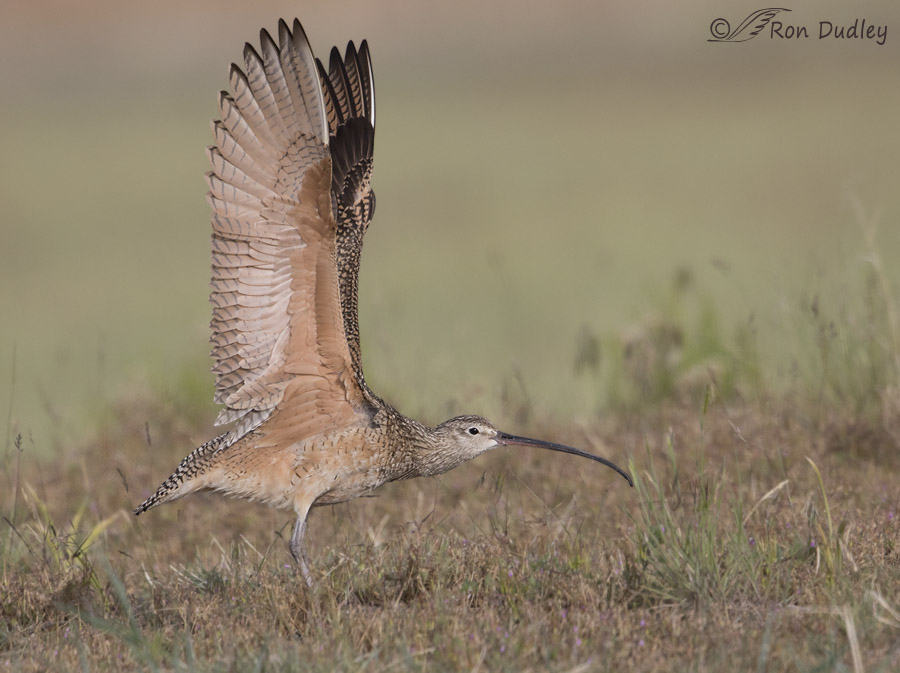The plumage colors of the Long-billed Curlew are generally unremarkable until it raises its wings to reveal beautiful cinnamons and pinks.

1/3200, f/6.3, ISO 500, Canon 7D Mark II, Canon EF500mm f/4L IS II USM +1.4 tc, not baited, set up or called in
I seldom get wing-lifts from curlews. Usually, to see these colors I have to catch them in flight but as I was photographing this male (females are larger and have a longer bill) 6 days ago on Antelope Island he lifted his wings more than once. This time it was a long drawn-out affair that lasted over 4 seconds and provided me more than 30 beautiful, though somewhat similar images.
One of my spring-time goals with this species is always to catch curlews fighting or mating but so far this season I’ve been unsuccessful (incessant rain and gloomy skies have something to do with that) so as a consolation prize I was happy to get this pose.
Ron
Note: Due to “technical difficulties” todays post is an abbreviated one. To make up for that may I suggest that readers revisit yesterday’s post “A Question Of Compatibility Among Owl Species“. Late last night after most folks had already seen the post my good friend Mike Shaw from HawkWatch International described in a detailed comment an experience he had recently with owls that relates to that post and borders on the unbelievable. He even provided photos which with his permission I’ve added to the post.
If you love owls (and good news) I think it’ll be worth your time.


Oooooh.
Muted magic. And an unexpected treat.
Re yesterday’s post. I loved it – and the additions and have been busy sending the link across the blogosphere to rather a lot of owl lovers. Thank you.
Not only are the beautiful soft rosy colors revealed, but the length of the wings is revealed when they lift them so high…I always find their wings surprisingly long. ( I love seeing hidden beauty unexpectedly revealed. I like surprises)…
“I love seeing hidden beauty unexpectedly revealed”
Me too, Patty. Serendipity…
Fantastic pose. I’ve never seen them doing this. Could be a time-of-year-when-I-see-them issue or merely limited sample time.
I don’t see it often either, Dave, but I think this bird did it 3 different times within a few minutes.
Your yesterday’s post made my day. Very very interesting.
I am so glad I have found your blog and your community of friends and commentators.
Thank you very much.
Thanks very much, Jorge. I’m glad you enjoyed it as much as I did (especially the contributions of some of my readers).
Jorge-you’ve not only “found” Ron’s community of “friends and followers”, but you’ve become both “friend” and follower….
Agree wholeheartedly, Patty.
Thank you Patty.
Thanks to both of you.
I love this. It reminds me that we don’t see anyone’s true colors until they are relaxed enough to show us everything. Pretty bird.
Pretty bird.
Well said, Arwen. Thanks.
Ron, those rich cinnamonly colors only occur in nature. What a wonderful catch for you. I was unaware that female curlews were larger than males. Not only is your blog always a visual treat but I usually learn some ornithology. Too lazy to go to BNA. Thanks
Ok, I’ll be your BNA intermediary, Diana! Thank you.
Damn technical difficulties, we all have them from time to time, the age we live in.
I wish I had had a long lens the the 70’s when on a camping trip to Texas I saw my first of several Long-billed Curlews! What a beautiful sight!
Love the colors.
Great shot Ron.
I wish you’d had that long lens too, Dick! Thank you.
Sensational shot Ron! Thanks so much for sharing!
Charlotte
Thanks, Charlotte.